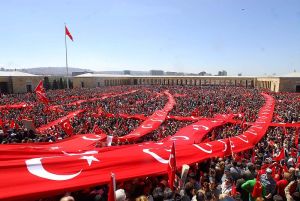Turkish Domestic Reform Package Draws Mixed Response
Speaking at a meeting of Turkey’s Justice and Development Party on October 21, Turkish Prime Minister Ahmet Davutoğlu explained the details of a domestic security reform package meant to enhance the civilian and democratic identity of the state and demonstrate the government’s confidence in the people. One of the bill package’s goals is to create a more practical and efficient civil system for Turkish citizens, increasing the ease with which they interact with the state. The reform plans to give more power to law enforcement agencies, and it involves a restructuring of both the Turkish police department and the Interior Ministry. It gives authority over the personnel and records of the Turkish Gendarmerie and Coast Guard to the Interior Ministry, additionally outlining new guidelines for appointments and uniforms of the group members.
The bill specifically addresses protest practices in detail. According to Davutoğlu, the new law will prevent attacks against peaceful demonstrations, but it will also treat demonstrations that become violent as crimes. Protesters covering their faces will be seen as potential criminals and will be removed from demonstrations, as the act constitutes a "declaration that the person will commit a crime by hiding his identity," according to Davutoğlu. The bill outlaws the possession of Molotov cocktails, which were previously legal, calling them “instrument[s] of assault”, and points to the heavy penalties associated with having them in the Unites States and United Kingdom.
The reform package has sparked outrage from the opposition, which claims that it threatens citizens’ right to protest and that it will turn Turkey into a police state. Davutoğlu warned foreign media outlets against characterizing the reform as authoritarian while the same types of measures exist in their countries, telling them “to engage in self-criticism first.”
The segment of the reform package concerning demonstrations is a direct response to the protests earlier this month that took place in cities across Turkey. The protesters were angry at the state’s lack of support for the Syrian border town of Kobane, which was and still is under attack from Islamic State (IS) jihadists. Some worry that this crisis is rekindling the flames of civil war in the region, once more creating tension between Turkey and the Kurds living there.
The protests were led by the Kurdistan Workers Party (PKK), a group that has fought a decades-long insurgency for self-determination in southeastern Turkey and that has been labeled by the Turkish government and the European Union as a terrorist organization. At least 34 people were killed and 360 wounded during the demonstration, while schools and libraries were attacked and ambulances were burnt down. The Turkish police received widespread criticism for their response, which included the use of tear gas and water cannons.
A week before the protests, Turkey had promised to prevent Kobane from being taken by IS, and the Turkish Parliament had even authorized military operations against militants in Syria and Iraq. However, the Turkish border police had stopped groups of Kurds reportedly crossing the Turkish border so that they may go to Kobane and fight. Some protesters went so far as accusing the Turkish government of being in cohorts with IS, but it is more likely that Turkey feared aiding the Kurds in Syria would fuel Kurd nationalism and self-determination in Turkey. It wasn’t until last week that Turkey, under heavy US pressure, announced that it would allow the Iraqi Peshmerga, armed Kurdish fighters, to cross its territory and join the fight in Kobane.
Davutoğlu’s legislation attempts to cover a lot of ground, but it’s mainly concerned with human rights issues in an obvious attempt to cater to the European Union during Turkey’s continued accession campaign. Davutoğlu explicitly stated that all of the proposed reforms must first be approved by the European Union Harmonization Committee, a body established in 2003 that makes certain new Turkish legislation is in sync with that of the EU. The outgoing head of the European Union Delegation to Turkey, EU Ambassador Stefano Manservisi, has remarked that the restructuring of the Gendarmerie is a “positive step” towards demilitarization, but Turkey still has a long way to go before the EU considers changing its opinion on Turkey’s accession.

